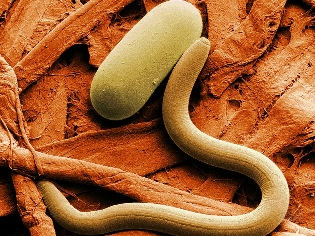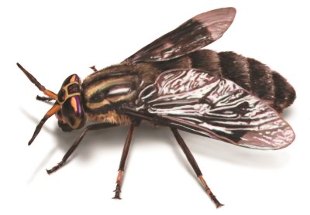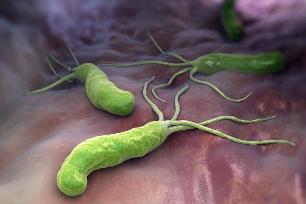
You cannot be 100% insured against parasites. They were settled and will be populated into the body of almost every person DAILY!
Human parasites are parasites that humans are susceptible to infection. The general definition of the word "parasite" applies not only to multicellular and protozoa living at the expense of their host and to the detriment of the latter, but also viruses, bacteria and fungi with similar qualities. However, according to historical tradition, and from the point of view of medical parasitology, it is customary to call parasites any creatures leading a parasitic lifestyle, except for viruses and bacteria with similar qualities.
Medical statistics are shocking: according to statistics from the WHO (World Health Organization), about 95% of the entire population of the Earth is infected with parasites - microorganisms that exist and feed on other organisms.
The parasitic world inhabiting the human body is huge. Long, reaching several meters or, on the contrary, invisible pests are often not even noticed by people. At the same time, parasites in humans invade the body, making it their home. In it they live, feed and reproduce. Pests inhabit hair, skin, and affect internal organs. Only a few indirect symptoms, such as obesity, chronic fatigue, can one suspect the presence of parasites.
Experts believe that the main reason for such a wide spread of the disease is poor awareness of people about the routes of infection, the first symptoms of the disease and prevention measures, as well as a low culture of public health.
Why are parasites dangerous?
Science has more than 250 species of only various worms that inhabit not only the human intestines, but also the liver and lungs. Starting from the smallest and ending with worms, up to several meters long. In the course of research, scientists have found that the toxins released by pests become sources of infectious diseases and even cancer. About 15 million people die every year due to parasites. At the same time, people do not even suspect about uninvited guests.
Parasites in humans, as a rule, live long. They multiply actively. Therefore, the diseases they cause take on a chronic nature, with frequent relapses. Parasites living in a person deplete the body. Systems cease to function fully. As a result, immunity is significantly reduced. Such people become the most vulnerable to various infections. The body, poisoned by toxins, weakens.
These processes do not occur with lightning speed. However, ignorance about the presence of pests and, accordingly, the lack of treatment for a long time leads to serious health problems.
How does the infection occur?
You can become infected with parasite larvae by eating unprocessed and or insufficiently processed foods (fish, meat), poorly washed raw vegetables, herbs and fruits, when bitteninsects, during intercourse, in any household way, through dirty hands, if the rules of personal hygiene are not observed, drinking raw water, as well as swallowing water, while swimming in water, from pets, through the soil, when using other people's personal hygiene products, in close contact with a sick person. The source of infection can be public transport, handrails, seats; banknotes; your car; computer keyboard or mouse; cell phone . . . Continue? ! The list is endless!
A fly, for example, is the closest carrier of parasite eggs to humans. They carry the eggs of parasites on their paws, which then enter a person along with food. Polluted settlements, hot climate, unsanitary conditions, violations of personal hygiene rules increase the likelihood of infection.
The presence of cockroaches, rats, mice in residential premises, as well as in premises related to the catering network, also significantly increases the riskinfestation with parasites.

The human body is affected by different types of parasites living on the body, or inside it, localized in different organs and systems. They differ in size, characteristics of life, enter the body in different ways. But all of them have one thing in common - a detrimental effect on health. In the process of life, they affect organs, release toxins, and absorb useful substances necessary for the full functioning of the body. In case of infection, it is important to start early treatment.
It is believed that various types of human parasites find their home only in the large intestine. It is wrong. After all, you can find uninvited guests in any area of the body:
- in the muscles;
- lungs;
- liver;
- joints;
- the brain ;
- esophagus ;
- blood ;
- eyes ;
- in the heart.
Helminths, for example, sometimes live in the body for decades. They are fully adaptable to all conditions. Therefore, it is quite difficult to identify them. It is also difficult sometimes to establish the very fact that such parasites are actually in the human body. Symptoms that indicate their presence are a signal to start a fight. Otherwise it might be too late!
Often, signs of parasites in the human body are overlooked because some of them are very well adapted, and signs can be mistaken for other diseases. Very often, it is quite difficult to recognize the presence of the pests in question in the body of an individual. And many of the symptoms can be mistaken for a chronic condition and treated unsuccessfully. Symptoms of the disease may differ depending on the type of worms or parasites, their location and number.
Some of them are not so difficult to identify: the symptoms are quite common, but if conventional medications do not help them, most likely you havedealing with especially dangerous pests and they need to be removed by special means.
The problem is that when a disease is not treated promptly and properly, it can lead to serious complications of our health.
Below are the main warning signs of the presence of parasites in the body.
The symptoms of parasitic infections are often confused with other diseases, and that is why today we want to talk with you in detail about the warning signals that your body will beemit when there is a parasitic infection.
There are general signs of parasites in the human body. These are the signs that you should pay close attention to:
Symptoms of the presence of parasites in the body from the digestive system
Official medicine has more than 250 types of helminths that can provoke serious illness and even death. Helminths are the general name for worms that exist in a living organism. Simply put, worms.
The following signs will help you identify the presence of worms in the body. Worms mainly harm the digestive system. But their waste products have a negative effect on the entire body as a whole.
Constipation
Constipation is one of the most common symptoms. According to statistics, more than 65% of the population suffers from constipation.
Worms can definitely be the cause of constipation. This sign indicates that there are oversized parasites in your gastrointestinal tract. They can block the biliary and intestinal tract, i. e. blockage of the intestinal lumen, leading to difficult bowel movements. Because of the size of the parasites or because of their large number, the digestive tract is blocked, which leads to difficulties with defecation. By the way, if you still managed to empty the intestines, most likely you will find parasites in the feces.
If the present helminth infection is already so abundant that it can block the biliary and digestive tracts, then the person begins to pursue problems with a difficult andrare stools.

Diarrhea
Often with this bowel disorder, we think of stale foods, dysbiosis, indigestion or other causes, not suspecting that it may be parasites.
Worms are one of the causes of diarrhea. The fact is that many of them secrete substances similar to hormones, which cause diarrhea in a person. As a result of their vital activity, worms produce substances that lead to the removal of chloride and sodium from the body.
There are parasites that produce an element such as prostaglandin, which helps to destroy sodium and chloride, which leads to increased frequency and watery stools. It should be noted that loose stools, in this case, are not the body's actions to cleanse, driving away parasites, but this is precisely the function of this parasite.
Diarrhea is one of the most common symptoms of helminth infection. Prostaglandins, which are produced by parasites, as mentioned above, lead to frequent watery stools, i. e. a person has frequent painful watery bowel movements.
Gas, bloating (flatulence)
If you have been suffering from bloating for a long time (more than several weeks) and medications do not help, this is a reason to cleanse the body, after all, these symptoms can be caused by the presence of parasites.
Worms and flatulence are twin brothers! Often, it is parasites that cause severe gas formation, bloating and intestinal inflammation. When heavy food is consumed, the condition worsens.
There are parasites that multiply in the upper small intestine. By their vital activity, they form inflammatory processes in this area, which leads to the formation of gas and bloating.
Thus, due to dysfunction of the intestines, symptoms such as diarrhea, constipation, excessive gas formation occur, which are often mistakenfor dysbiosis.
Irritable bowel syndrome
This is a complex disease that includes all of the above symptoms. The function of absorption of nutrients, especially fatty ones, is impaired. Excess fat in the stool is also common. The presence of parasites can also be indicated by symptoms such as a change in the anus, blood in the stool. Many parasites colonize the large and small intestines of the individual. They stick to the walls, irritate them and contribute to the onset of inflammatory processes in the organs.
Gastric and intestinal discomfort is also a consequence of the colonization of helminths.
Stomach problems
The parasites that are inside your body can cause stomach irritation and concomitant inflammatoryprocesses. Irritation, in turn, leads to various diseases. In humans, for example, hard feces begins to form.
Separately, when it comes to the stomach, it must be said about the helical gram-negative bacterium Helicobacter pylori (Helicobacter Pylori).

This bacteriuminfects various areas of the stomach and duodenum. Many cases of gastric and duodenal ulcers, gastritis, duodenitis, stomach cancer and possibly some cases of gastric lymphomas are etiologically associated with Helicobacter pylori infection. However, the majority (up to 90%) of infected carriers of Helicobacter pylori for a long time do not show any symptoms of disease.
The spiral form of the bacterium, from which the generic name Helicobacter comes from, is believed to determine the ability of this microorganism to penetrate the gastric mucosaand the duodenum and facilitates the movement of bacteria in a slimy gel covering the stomach lining.
Bile stasis
Due to their enormous size, some parasites can block the bile ducts and cause biliary dyskinesia. These signs can trigger other, more serious liver diseases.
Weight problems
The presence of parasites can be evidenced by any appetite disorder, both excess and its absence. If there are moments such as weight loss and a constant feeling of hunger, a person eats a lot, but an irreconcilable feeling of hunger is constantly present - the reason is probably worms and parasites of all stripes.
One of the signs of helminthiasis is weight loss orobesity. Weight loss occurs due to the inability to obtain nutrients from the foods consumed. And weight gain, as a result of the body's reaction, the need to "stock up on food for future use. "
If you eat enough food, or even overeat, but still lose weight, this is a reason to cleanse the body. Although some people deliberately add parasites to themselves in order to lose weight in this way, it is very unsafe, and it is better to get rid of them as soon as possible.
With helminthic infestation, "dependents" take root in our body, which require additional nutrition. . . Helminths, assimilating our food, deprive us of nutrients, leaving us only empty calories, and this leads to obesity.
Uncontrolled weight gain is a defense reaction to substances secreted by worms. Therefore, before going on a diet, take a course of deworming.
Taste preferences
There is no such person who does not periodically develop a craving for sweets. But sometimes this craving becomes just pathological! There can be many reasons - from hormonal disturbances to micronutrient deficiencies and stress. But it is important to know that pathological cravings for sweets can appear if a person is infected with parasites - fungi, bacteria, worms. After all, carbohydrates are their food, and they begin to impose their taste preferences on a person.
Symptoms of parasites in the body from the nervous system
Many people think that parasites only affect digestion, but thisnot this way. They affect all areas of the body and the nervous system too, including the brain.
Waste products and toxins of parasites have a very detrimental effect on our nervous system. That is, if the body is poisoned by helminths, then depression, anxiety, anxiety and nervousness become constant companions of a person.
General nervousness
Substances released by a number of parasites have a bad effect on the human nervous system. They are often the cause of irritability, anxiety and anxiety, and even depression.
Sleep problems
Insomnia, poor short sleep, can be a nervous system response topresence of “illegal” residents. Some helminths come out through the anus at night in order to lay the larvae. This can cause discomfort and itching, which makes you wake up often and does not give you the opportunity to fully rest.
The liver, for example, gets rid of toxic substances at night, because of this, you can often wake up. Also, the cause of awakening may be the activity of worms, leading to burning and itching. Also, bruxism can be attributed here - teeth grinding in a dream.
Or it is at night that many worms come out of a person's anus to lay their eggs outside and this leads to itching in the anus, which is why a person is also constantlywakes up.

Chronic fatigue
If you know constant weakness, fatigue, frequent headaches, apathy and depression - most likely you have this very condition, which is called "syndromechronic fatigue ". This disease can be caused by parasites, as they affect the metabolism and poison the body. Against the background of general intoxication of the body, lack of vitamins and nutrients that are absorbed by parasites, the individual may feel constant fatigue, decreased concentration, apathy and memory impairment.
If you have noticed such signs of chronic fatigue as weakness, memory impairment, apathetic mood, lack of concentration, depression, then they may be caused by the fact that parasites living in your body steal from your foodall nutrients that impede the normal process of your life. That is, parasites take away your food, depriving you of your strength. And the presence of constant poisoning with parasites further worsens your condition.
Other symptoms of the presence of parasites in the body
Parasites in the body can be identified by other symptoms:
- Excessive sweating (hyperhidrosis):
- Constant pain in joints, muscles: worms and parasites that live in your body often move throughout the body, and may even get into joints and muscles. Because of this, muscle and joint pain is felt. Trichinella, for example, settle in muscle tissue and can damage it, and symptoms of arthritis appear. This is the body's response to the vital activity of parasites. It turns out that parasites can move around the body for the purpose of encapsulation. For this, muscle tissue and joint fluid are used. This phenomenon is often confused with arthritis, because a person experiences similar sensations when parasites are present in these parts of the body. Also, pain is caused by the destruction of these tissues by harmful organisms or the immune response to their presence.
- Allergy that does not stop for a long time. As a result of metabolic processes, worms, subcutaneous mites or other parasites release toxic elements that penetrate the circulatory system and contribute to the occurrence of allergic manifestations. The rash may periodically come on and off. Such an allergy is difficult to treat with dermatological agents. And it is often accompanied by severe and disturbing itching. When parasites destroy the intestinal lining, undigested food can enter the bloodstream as large molecules. This mobilizes the immune system and causes allergies. And by themselves, parasites can cause allergies.
- Problem skin: your skin can respond to the presence of worms, and its condition worsens. Inhabitants unwanted in the body cause skin rashes throughout the body in the form of a rash, hives or eczema. These are standard signs of worms and other parasites in humans. Infection with worms can also manifest itself as dry skin, various inflammations in the form of acne, acne, and boils. Demodecosis is a skin disease caused by the presence of the demodex mite. It gives its owners a lot of problems, since it does not respond well to treatment, is accompanied by relapses. One unpresentable view is worth it! And even papillomas, tumors and ulcers may indicate the presence of a parasitic lesion.
- Anemia: Some parasites, Trichomonas, for example, can infect various human organs, including the blood. Feeding on its cells, helminthiasis provokes anemia and iron deficiency.
A huge amount of worms and parasites can cause bleeding. Therefore, there is a possibility of developing pernicious anemia, that is, a lack of iron.
- Reduced immunity: parasites feed on what a person eats. They absorb most of the digested nutrients. Due to the constant response of the immune system to the presence of "outsiders", the defenses of the organisms decrease, and the immune system weakens. This is manifested by frequent colds, unreasonable fever, body aches, etc. In the presence of parasites, the release of immunoglobulin decreases, as a result, the immune system weakens. Since the body is constantly trying to unsuccessfully fight parasites with the help of the immune system, this system weakens and it does not have reserves to fight other bacterial and viral diseases.
- Inflammatory processes of the respiratory system: If you are haunted by a cough, runny nose and fever, these are not always symptoms of a cold. Perhaps these are signs of the presence of parasites in these organs. Ascariasis is often manifested by pneumonia.
- Oncology: the presence of parasites does not have the best effect on the human body as a whole. The normal functioning of all organs is disrupted, inflammation occurs, health worsens, and immunity decreases. It is important to know that all these signs, with prolonged action, can provoke the formation of tumors and neoplasms. Parasites cause a huge amount of damage to the body, which can become the ancestors of malignant diseases. They can be provoked by such violations as - a constant toxic effect on the body, impaired immunity, trauma to tissues and organs, inflammation and lack of nutrients.






































